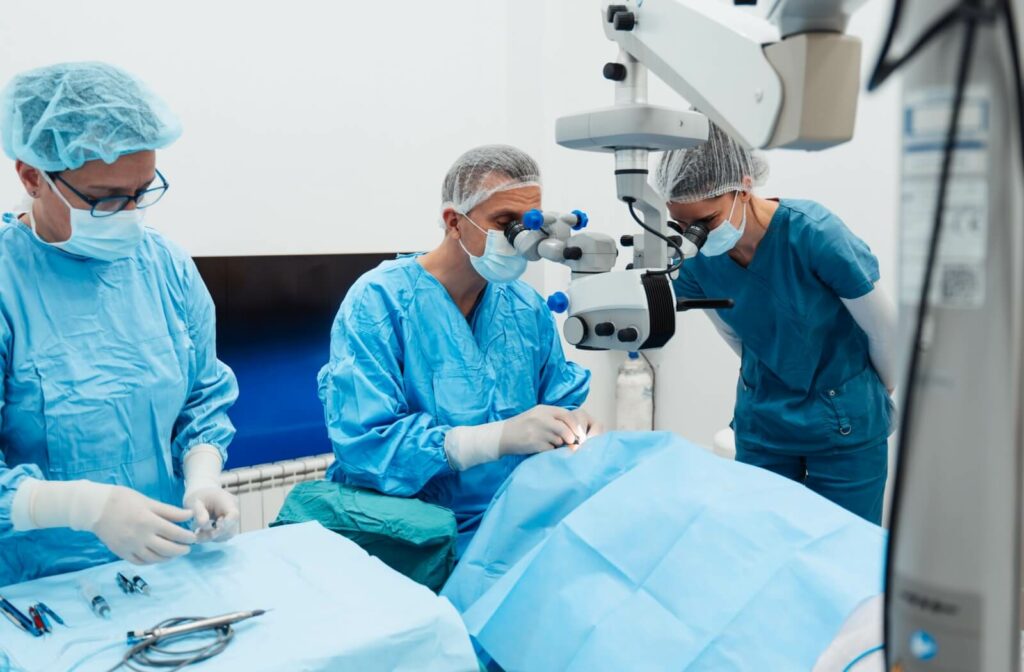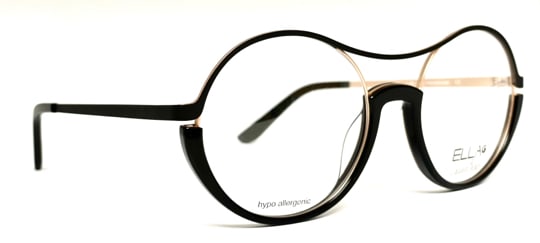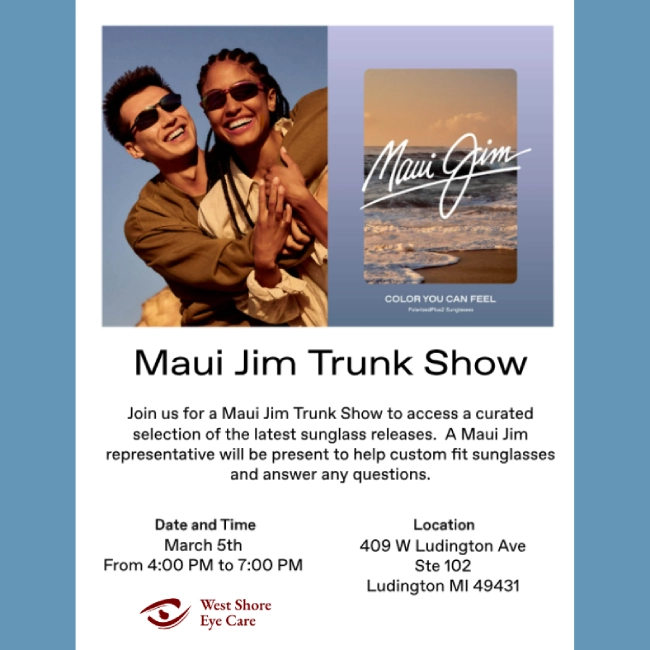Cataracts can cause your vision to become blurry or dull, gradually making everyday activities like reading, driving, or recognizing faces more challenging. Over time, colors may seem faded, lights may cause glare, and it might feel like you’re looking through a fogged-up window.
Cataract surgery removes the clouded lens of your eye and replaces it with a clear implant in order to help you see more clearly. This is a safe and proven way to regain visual clarity and improve quality of life. Many people use cataract surgery as an opportunity to get a lens implant that can address other vision concerns, such as astigmatism or the need for reading glasses.
What is Cataract Surgery?
Cataract surgery is a safe and straightforward procedure that replaces the cloudy lens of your eye with a clear, artificial lens. The process generally goes as follows:
- Preparation: Your surgeon will use numbing eye drops to minimize discomfort. You may also receive light sedation.
- Lens Removal: A small incision is made in your eye to access and remove the cloudy natural lens. Surgeons often use ultrasound to break up the cataract for easier removal.
- Lens Replacement: A clear artificial lens, called an intraocular lens (IOL), is placed in your eye to restore your vision.
Cataract surgery has an impressive success rate, with 97% of patients experiencing significant vision improvement.
What Are Lens Implants?
Lens implants, or intraocular lenses (IOLs), are artificial lenses that replace your eye’s natural lens during cataract surgery. Today’s advanced IOL options allow for more than just improved clarity; they can also address common vision problems like nearsightedness, farsightedness, and astigmatism.
Types of Lens Implants
Here’s a quick look at the most common types of lens implants available and how they cater to different needs:
- Monofocal Lenses: These provide excellent clarity for one distance (usually far), but reading glasses may still be needed for nearby tasks.
- Multifocal Lenses: Perfect for patients who want clear vision at multiple distances, reducing or eliminating the need for glasses. Ideal for people who want a glasses-free lifestyle.
- Toric Lenses: Specifically designed to correct astigmatism, ensuring sharper and more focused vision.
- Accommodative Lenses: These lenses adjust within the eye, mimicking the natural movement of your lens to focus at different distances.
Choosing the right lens implant depends on several factors, including your lifestyle, vision goals, your budget, and whether you have other conditions like astigmatism. Some people may prioritize distance vision for driving and outdoor activities, while others may want to minimize the need for reading glasses.
Talking with your eye surgeon about how you use your vision daily can help determine which lens offers the best balance of clarity and convenience. It’s not a one-size-fits-all decision, and understanding your options can lead to more satisfying long-term results.
Not everyone is a good candidate for multifocal implants. Dry eyes, past surgeries, or even personality type can affect the outcome. That’s why our clinic performs a full ocular surface assessment before surgery, helping patients get the results they truly need.
Benefits of Cataract Surgery & Lens Implants
Choosing cataract surgery with lens implants offers more than a clear view of the world. Here are some benefits you can look forward to:
- Improved vision: Enjoy vibrant colors, sharper details, and brighter light. Many patients describe it as seeing the world in HD!
- Customized vision solutions: Lens implants allow you to correct other vision issues, which can mean ditching glasses or contacts altogether.
- Quick recovery: Most people see improvement within days and return to normal activities in about a week.
- Improved quality of life: From reading a book to driving at night, everyday tasks become much easier and more enjoyable.

How to Prepare for Cataract Surgery
Preparing for cataract surgery is a straightforward process, but it’s still importantl to follow your doctor’s guidance. To help you feel confident, here are a few steps to keep in mind:
- Schedule a comprehensive eye exam: Your doctor will assess your vision, discuss your options, and help you choose the right type of lens implant.
- Follow pre-Surgery instructions: You may need to temporarily stop certain medications or start using prescription eye drops as directed.
- Arrange transportation: Since your vision may be blurry after surgery, having someone drive you home is a must.
- Relax: Cataract surgery is routine and safe. Your West Shore Eye Care surgeon will ensure you’re comfortable every step of the way.
What to Expect After Surgery
Recovery from cataract surgery is typically smooth and quick, but knowing what to expect will help you feel more at ease.
- Immediate recovery: You might notice improvements in vision as soon as the day after surgery, though full recovery takes about 4-6 weeks.
- Post-surgery care: Use prescribed eye drops to prevent infection and inflammation. Avoid heavy lifting and strenuous activities.
- Follow-up appointments: Regular check-ups with your eye care provider will monitor healing and ensure optimal outcomes.
Our team at West Shore Eye Care is here to support you during recovery, answering any questions and ensuring your vision is on the path to clarity.
Can I Fly After Cataract Surgery with Lens Implants?
Yes, most patients can safely fly after cataract surgery with lens implants, but it’s always best to follow your surgeon’s specific advice. In general, flying is not restricted after surgery, but you may be asked to avoid it for a few days to ensure proper healing and to attend your follow-up appointments.
If you’re planning to travel shortly after surgery, make sure you’ve had your initial post-op checkup and are not experiencing any complications such as discomfort, blurry vision, or increased eye pressure. Dry cabin air can also irritate the eyes, so keeping lubricating eye drops on hand is a good idea.
As always, talk to your surgeon before booking a flight to make sure it’s safe based on your personal recovery progress.
Take the First Steps Towards Clearer Vision
Cataract surgery and lens implants open the door to clearer vision. If you’re ready to regain your visual clarity, schedule a consultation with West Shore Eye Care today. We’ll help you explore your options, answer your questions, and design a treatment plan tailored just for you.























